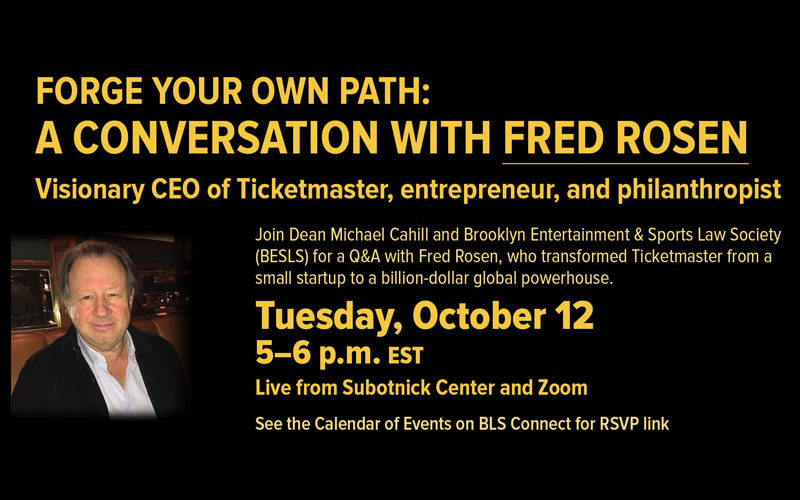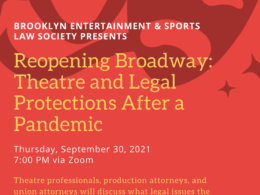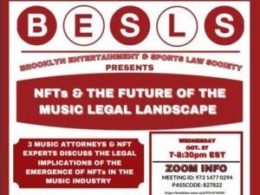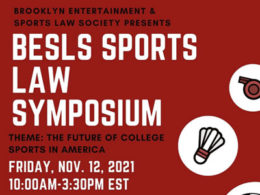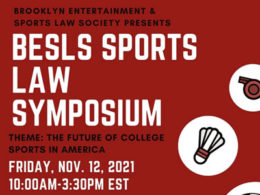On Tuesday, October 12th, BESLS hosted a discussion, with Brooklyn Law School alumni, Fred Rosen. Speaking in the Subotnick Center in front of about 65 students, faculty, and guests, and to a smaller contingency over Zoom, Mr. Rosen fielded questions from Dean Cahill, and candidly discussed a wide array of topics ranging from his law school experience, career, and a few of the lessons he learned along the way.
The conversation began with Dean Cahill asking what life was like prior to law school for Mr. Rosen, who quickly quipped: “there was one, I do not recall.” While this was said tongue-in-cheek, when listening to Fred discuss his upbringing it is easy to understand why he would say such a thing, as he knew that his destiny included going to law school “by the time I was three or four years old.” Reflecting on his time spent at BLS, Fred stated: “law school gave me the keys, but what I decided to do with those keys, was entirely up to me.” Upon graduating from BLS, Fred spent the next decade practicing at a variety of small firms. The decade he spent practicing allowed him to refine his relationship-building skills and develop a solid client base. Forging these connections allowed Fred to become “more risk-averse” and the stable pipeline of business permitted him to “bet on himself and never look back.” It was through these early connections, and a few “serendipitous events” that put Fred on the map at Ticketmaster.
Almost immediately, Fred recognized the untapped market that Ticketmaster could swallow up. Upon this realization, Fred knew he had a special business blueprint. He believed that if he was given full autonomy to achieve his mission, he could transform the market for entertainment event tickets. The mission was simple: “make it really easy for the public to get tickets, at a cost, because nobody pays more for a ticket then they want to, the market will always set the price.” Those in his inner circle doubted his business acumen, they did not see this as a viable market. However, Fred remained undeterred in his vision, he did not understand at that time “why 80% of tickets were bought at the venue on the day-of the event” and he sought to change this. Many people along the way arbitrarily told Fred “you cannot do that” but he scoffed off these suggestions. “When you get comfortable in your own skin and when you have an idea that can change an industry, you will undoubtedly aggravate some people, I learned to live with that.”
With Broadway’s lights growing dim, what could the future look like? Wendy LaManque took to the stage to address this question, expounding on her expertise in labor law. Where some see the devastating decline of the behemoth Broadway industry, LaManque sees opportunity. She noted that, for the first time, Broadway shows came into the home of their viewers. Broadway became accessible to audiences all over the world who could not previously attend shows. The price for a fantastic, accessible orchestra seat to Hamilton tumbled from $300 to the price of a Disney+ subscription. The work successfully playing out live in New York looks completely different, too. Plays flood the theaters! Pieces like Pass Over and Chicken and Biscuits lead a new Broadway that does not exist to rake in cash but to tell stories that simply have to be told by artists and seen by audiences. One could argue that COVID devastated the model of Broadway production, but it is more likely that it only magnified the cracks that already existed. Perhaps the challenges occurring in returning to Broadway do not signal the end of an institution, but the end of an industry. The institution has always been and will always be more than the industry. As Broadway’s path forward slowly turns in a new direction, the future looks bright for enterprising law students eager to shape and build what comes next.
While a novel business idea set Fred’s career in motion, he acknowledges that he still needed to execute his plan. In describing how he accomplished this, Fred articulates his relentlessness- not just in his work ethic but also in striving to create an equal and pleasant work environment for his employees. To run a successful business, Fred sees the two as going hand-in-hand. Speaking about the importance it is in business to always have your employees backs, Fred indulged us in an anecdote about how he threatened to cancel a contract because of the way the other party was treating his employees. Fred stated, “I threw the contract right on the table and told him to rip it up, if he wanted to complain and be abusive, he could do it to me and only me, not my workers though.” By going to bat on behalf of his employees, Fred set an example from the top-down that everybody under his stewardship would be treated properly.
The combination of the skills Fred accumulated in law school and his natural entrepreneurial disposition are apparent when listening to some of the lessons Fred learned throughout his negotiations. Fred articulated three “signs” that always signaled to him that he was engaging in worthwhile negotiations:
- 1. “Always negotiate multi-year contracts, one-year contracts give no incentive for the other side to work with you. They can terminate the agreement because they think you sneezed funny, longer agreements create a partnership.”
- 2. “Always negotiate raises, it gives your workers something to work for.”
- 3. “Put yourself in the shoes of your adversary and understand what they need. A deal cannot be consummated until you acknowledge what they are going to want. Make agreements “living” so nobody ever needs to refer to the contract, and so that it can easily evolve.”
Speaking to this third point, Fred stated that whenever somebody asked him what a term in the contract meant, he would always respond “whatever you want it to mean.” Allowing flexibility in the non-material aspects of the contract is one reason Fred believes he never lost a client while at Ticketmaster. Simply stated, “if you made a deal for X amount of dollars, do not let it evaporate over nickels.”
In Fred’s mind, his immense success at Ticketmaster created new obligations for him to undertake later in life. This is why he and his wife are establishing the Seymour and Hannah Rosen endowed scholarship at Brooklyn Law School. Creating this scholarship not only allows for future students to follow in Fred’s path here at BLS, but also allows Fred to honor his parents in their memory. As the discussion wound down Fred took the time to share a quote that he believes embodies his personality, and to all those who feel they have a different outlook on the world.
“Here’s to the crazy ones, the misfits, the rebels, the troublemakers, the round pegs in the square holes … the ones who see things differently — they’re not fond of rules, and they have no respect for the status quo. … You can quote them, disagree with them, glorify or vilify them, but the only thing you can’t do is ignore them because they change things. … They push the human race forward, and while some may see them as the crazy ones, we see genius, because the people who are crazy enough to think that they can change the world, are the ones who do.” – Steve Jobs.
We thank Fred for partaking in this wonderful discussion and for his immense generosity in supporting future BLS students.
Written by: Jake Sperber
Jake is a 2023 J.D. Candidate at Brooklyn Law School
